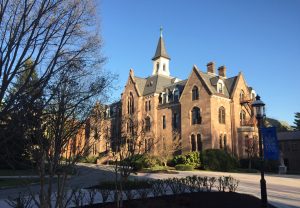Mission:
Green Power provides awareness about the issues of food accessibility affecting Newark communities of color while informing website visitors about the benefits of Newark’s active greenspaces. The project is built to be entirely collaborative, just as SHU PolicyLab’s mission states. We hope to work with organizations, volunteers, and city officials to create an informative, accessible, and functional resource for residents to easily access. Our website seeks to track, map, and feature community gardens throughout the city, while celebrating the organizations and volunteers that work so hard to keep them active.

Background:
SHU PolicyLab was founded in the spring of 2022 by Dr. Juan Rios, Dr. Kelly Harris, Timothy Hoffman, and Joseph Pastino. The program is a part of SHU’s Center for Community Research and Engagement but seeks to operate as a self-sustainable entity with active connections to the university. PolicyLab’s goal is to introduce people to the local government, its programs and policies in an accessible way.
Green Power as a digital project began when Joseph Pastino considered addressing issues of environmental justice through legislation. He thought to research the relationship between community gardens and sustainability after questioning the cause behind Newark’s food deserts – a region “where people have limited access to a variety of healthy and affordable food,” as defined by a study conducted by the USDA.
In attempts to address this problem, Newark’s Office of Sustainability have already put programs in place to help neighborhoods. The first program enacted was the city’s Adopt-a-Lot program, initially begun in 2004 to discourage littering on vacant lots and keep crime rates low. The program allows residents or volunteer groups to “adopt” vacant lots for $1.00 a year and care for the land by planting flowers, creating gardens, or setting up a space for residents to relax. This program is still active today, keeps neighborhoods looking tidy, and is a great way to introduce sustainable farming to communities. After the 2020 COVID-19 Pandemic, the Office of Sustainability established the Nourishing Newark Community Grants Program to aid grocers and organizations that are outlets for sustainable, nutritious sources of food. As per a news release from the City of Newark, “The Nourishing Newark Community Grants Program seeks to spur the creation and expansion of sustainable urban food cooperatives, and other community-based healthy food distribution channels.” You may learn more about these programs by contacting Newark’s Office of Sustainability or browsing their website.
During the Fall 2022 semester, Pastino reached out to Dr. Mary Balkun’s Introduction to Digital Humanities class to solicit volunteers to do research into the subject and build a website that would track greenspaces in Newark while providing accurate information about food insecurity in underserved areas. He teamed up with 2nd year graduate student, Amalia McEvoy, to begin the project. The Digital Humanities (DH) seeks to educate communities about issues through digital means, whether that is a website, curated exhibit, or the digitization of artifacts. DH looks to mobilize communities, either online or face-to-face. We hope this website can serve to keep the community unified and aware of what resources are out there.